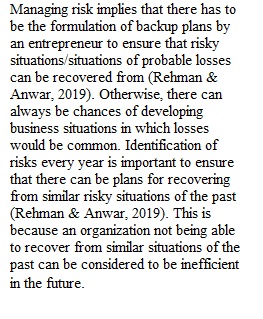


Q WEEK SEVEN The heading this week is: Managing Risks. Part seven of the report this week is an area that Mary has not considered well. It seems from the firm's initial interview that Mary has an attorney but she has only handled her contract work with respect with to leases and sales. She does have a general business insurance policy but now that she is working out of her home she is not sure if home owners insurance will be at issue with that policy. She does not even know if the city requires a license to do business in her home. In short, this looks like one of those areas that Mary just does not know enough about or has not planned for well. It is plain she needs educating. In this part of the report consider the following: • The firm wants Mary to understand what is meant by managing risk and why it is important to consider on a yearly basis. • The firm wants Mary to know all the potential risks her business may be exposed to now and in the future. The list should include not only the most common risks small business owners face but those specific to MobleyLights. The list should also identify those risks listed as present or possible future risk. • Give five recommendations as to how she can manage risk keeping in mind that Mary must keep costs down by identifying whether the cost is expensive. • Advise Mary about how growth of the business can affect the list.
View Related Questions